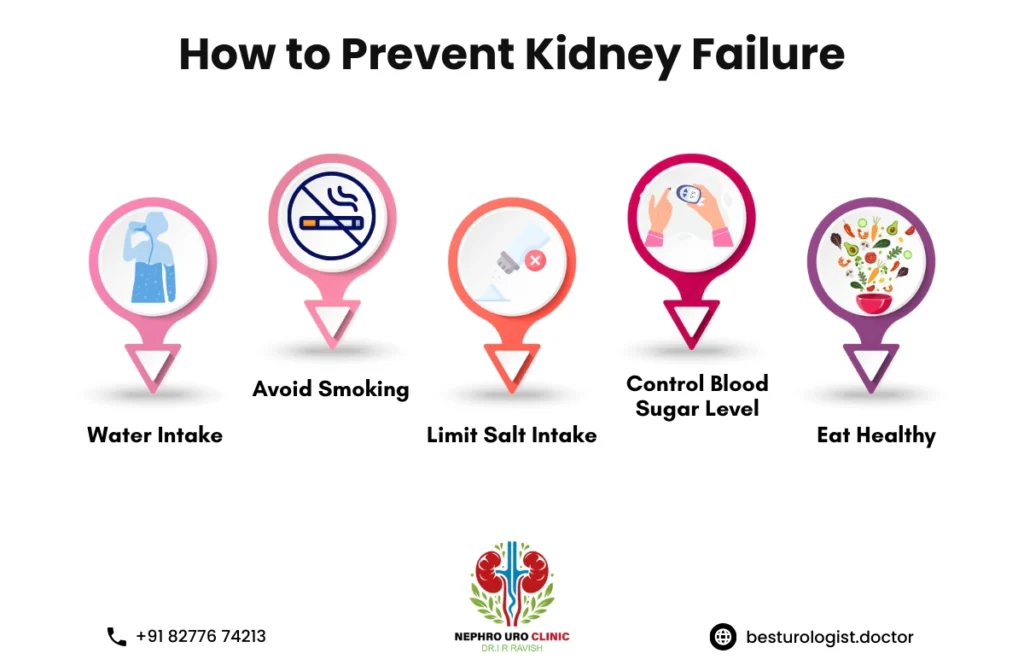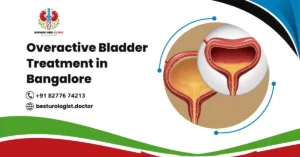When it comes to maintaining a healthy life, few organs play as vital a role as the kidneys. As the best urologist with years of experience, I have seen how small lifestyle changes can make a huge difference in how to prevent kidney failure.
Let’s explore this crucial topic together, understanding its causes, warning signs, and the steps you can take to protect your kidney health. Managing chronic conditions like diabetes and hypertension, staying hydrated, eating a kidney-friendly diet, and avoiding overuse of painkillers are effective strategies in how to prevent kidney failure. Early detection and proactive measures can safeguard these vital organs and ensure a healthier life.

What is Kidney Failure?
Kidney failure occurs when the kidneys lose their ability to filter waste and excess fluids from the blood. This can happen suddenly (acute kidney failure) or over time (chronic kidney failure). Without treatment, toxins can build up in the body, leading to severe complications.
Understanding how to prevent kidney failure starts with knowing its root causes and symptoms. Managing underlying conditions like diabetes and high blood pressure, staying hydrated, avoiding nephrotoxic medications, maintaining a healthy diet, and undergoing regular check-ups are essential preventative measures. These steps can help protect kidney function and reduce the risk of failure.
What Do the Kidneys Do?
The kidneys are vital organs responsible for filtering waste, balancing electrolytes, and regulating blood pressure. Each day, your kidneys process about 50 gallons of blood, ensuring your body maintains a delicate balance of fluids and nutrients. Without healthy kidneys, everyday functions such as energy production and waste elimination would grind to a halt.
Understanding how to prevent kidney failure is crucial for maintaining kidney health. Steps like staying hydrated, eating a balanced diet, managing chronic conditions like diabetes or high blood pressure, and avoiding excessive use of medications can help ensure your kidneys continue functioning efficiently. Early prevention is the key to avoiding complications and protecting these vital organs.
Who Does Kidney Failure Affect?
Kidney failure doesn’t discriminate. It can affect anyone, though people with high blood pressure, diabetes, or a family history of kidney disease are at greater risk. Older adults and individuals with preexisting conditions should be particularly vigilant in preventing chronic kidney disease and monitoring signs of kidney failure.
What Happens When Kidney Failure Starts?
When kidney failure begins, waste products accumulate in the body. This can cause symptoms like fatigue, swelling in the legs and feet, and trouble concentrating. If untreated, it can progress to life-threatening complications. Early detection is critical, which is why recognizing the warning signs of kidney problems is essential.
What Are the First Warning Signs of Kidney Failure?
- Swelling in the legs and ankles: When kidneys fail to remove excess fluids, swelling occurs.
- Fatigue and weakness: Toxins in the bloodstream can leave you feeling drained.
- Changes in urination: Blood in the urine, reduced output, or foamy urine can be early indicators.
- Shortness of breath: Fluid buildup in the lungs may cause breathing difficulties.
Recognizing these signs early can play a significant role in how to prevent kidney failure.
What Are the Most Common Causes of Kidney Failure?
- Diabetes: High blood sugar damages kidney filters over time.
- Hypertension: High blood pressure strains the delicate blood vessels in the kidneys.
- Infections and toxins: Certain infections and drug overuse can harm kidney function.
- Kidney stones and blockages: Chronic obstruction in the urinary tract can lead to kidney damage.
Avoiding these risk factors is a vital step in how to prevent kidney disease.
11 Tips on How to Prevent Kidney Failure
1. Maintain Healthy Blood Pressure
High blood pressure is one of the leading causes of kidney damage. Keep your blood pressure within the recommended range (around 120/80 mm Hg) to reduce strain on your kidneys.
2. Control Blood Sugar Levels
If you’re diabetic or pre-diabetic, controlling your blood sugar levels is critical. High glucose levels can damage the kidney’s filtering system over time, increasing the risk of failure.
3. Stay Hydrated—but Don’t Overdo It
Drinking enough water helps kidneys clear sodium and toxins. However, overhydration can stress the kidneys. Aim for about 8 glasses a day unless advised otherwise by your doctor.
4. Eat a Kidney-Friendly Diet
Limit sodium, processed foods, and red meat. Include more fresh fruits, vegetables, and whole grains. Foods rich in antioxidants like berries, garlic, and leafy greens help keep your kidneys strong.
5. Avoid Overuse of Painkillers
NSAIDs like ibuprofen and naproxen can cause kidney damage if used frequently or in large doses. Consult your doctor before taking medications long-term.
6. Monitor and Manage Cholesterol Levels
High cholesterol can lead to atherosclerosis (narrowing of arteries), which reduces kidney function. Adopt a heart-healthy diet and exercise regularly to keep cholesterol in check.
7. Stop Smoking and Limit Alcohol Intake
Smoking decreases blood flow to the kidneys and accelerates the progression of kidney disease. Excessive alcohol also increases blood pressure, leading to kidney strain.
8. Exercise Regularly
Regular physical activity improves cardiovascular health, maintains a healthy weight, and helps control blood sugar and blood pressure—all of which reduce kidney disease risk.
9. Get Regular Kidney Function Tests
Especially if you have risk factors like diabetes, hypertension, or a family history of kidney disease. Early detection is vital for taking corrective steps.
10. Limit Salt and Processed Foods
Too much salt raises blood pressure and burdens the kidneys. Choose fresh, low-sodium alternatives and read food labels to manage your salt intake effectively.
11. Stay Informed About the Signs of Kidney Failure
Knowing the Signs of Kidney Failure and acting on them promptly is essential. Early symptoms might be mild but can escalate quickly if ignored.
How Is Kidney Failure Diagnosed?
Doctors diagnose kidney failure using tests like:
- Blood tests: Check for creatinine and blood urea nitrogen (BUN) levels.
- Urine tests: Identify protein or blood in the urine.
- Imaging tests: Ultrasounds and CT scans assess kidney structure.
- Biopsy: In some cases, a small tissue sample is examined under a microscope.
Early diagnosis is crucial in preventing chronic kidney disease and managing its progression.
How Is Kidney Failure Treated?
Treatment depends on the severity of kidney failure:
- Medications: Manage underlying causes like diabetes or hypertension.
- Dialysis: Helps remove waste and excess fluids when kidneys fail completely.
- Kidney transplant: Replaces a diseased kidney with a healthy one from a donor.
Preventing chronic kidney disease through early intervention can help avoid these invasive treatments.
How Long Can You Live with Kidney Failure?
With proper management and treatments like dialysis or a transplant, people with kidney failure can live for decades. However, prevention remains the best strategy. Knowing how to prevent kidney failure can significantly improve both quality and length of life.
Can a Person Recover from Kidney Failure?
Acute kidney failure can often be reversed with timely medical care. Chronic kidney disease, on the other hand, requires ongoing management. Preventing chronic kidney disease is far easier than treating its advanced stages.
What Medications Are Used to Treat Kidney Failure?
- ACE inhibitors and ARBs: Lower blood pressure and protect kidney function.
- Diuretics: Help remove excess fluids.
- Phosphate binders: Reduce phosphate levels in the blood.
- Erythropoietin-stimulating agents: Treat anemia associated with kidney failure.
These medications, combined with lifestyle changes, help in preventing chronic kidney disease from worsening.
How Can I Prevent Kidney Failure?
Preventing kidney failure starts with healthy lifestyle choices. Follow the 7 Golden Rules of Kidney Disease Prevention and stay proactive about your health. Regular check-ups with the best urologist can provide personalized advice on how to prevent kidney failure.
What Is Chronic Kidney Disease?
Chronic kidney disease (CKD) is a long-term condition where kidney function gradually declines. It’s often silent in the early stages, making regular monitoring critical.
What Are the Symptoms of Chronic Kidney Disease?
- Persistent fatigue
- Swelling in the extremities
- Difficulty concentrating
- Changes in urination patterns
Recognizing these signs early helps in preventing chronic kidney disease.
What Are the Complications of Chronic Kidney Disease?
Complications of CKD include:
- Heart disease: CKD increases the risk of cardiovascular issues.
- Bone damage: Imbalanced minerals weaken bones.
- Anemia: Reduced production of red blood cells.
- Nerve damage: High toxin levels can affect the nervous system.
Preventing chronic kidney disease can reduce these risks and improve overall health.
Conclusion
How to prevent kidney failure? Start with small, consistent steps like monitoring your health, eating a balanced diet, and staying active. As the best urologist, my advice is to prioritize your kidney health today to avoid complications tomorrow.




